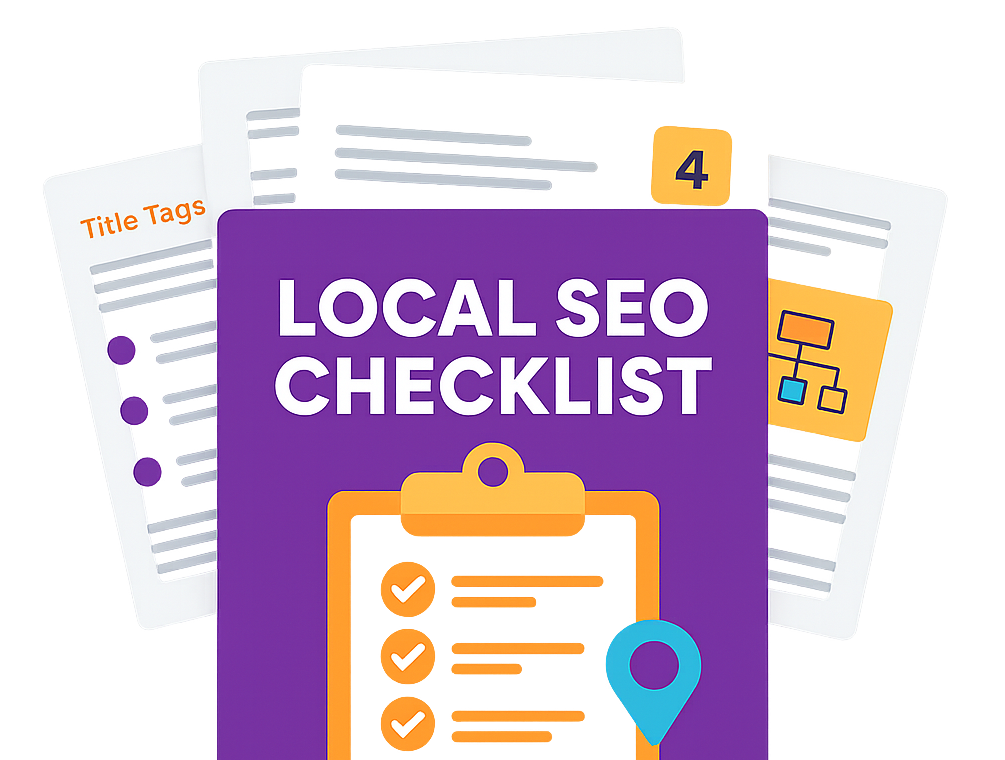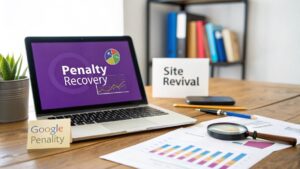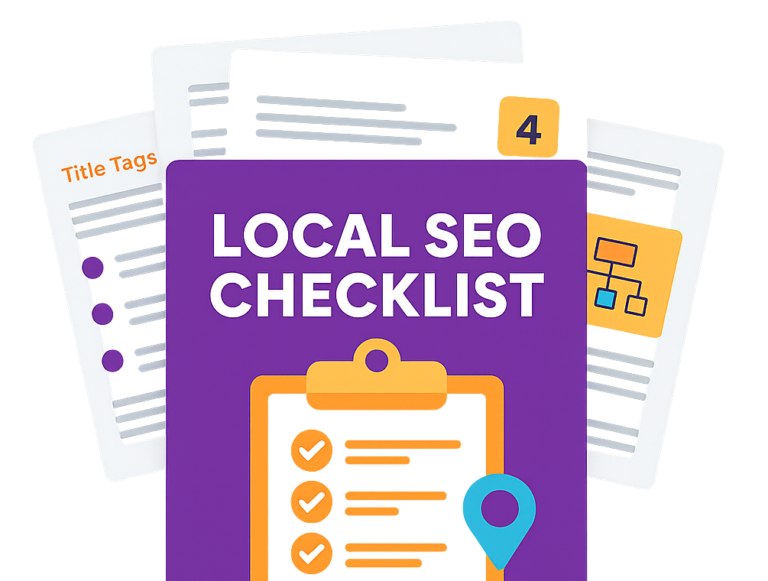Local SEO for lawyers is all about making your firm impossible to miss when potential clients in your area search on Google. It's the art and science of ensuring that when someone in your town needs legal help, your practice shows up—ideally, right at the top in the Google 'Map Pack'. When done right, this strategy drives a steady stream of high-intent enquiries straight to your door.
Why Local Search Is Your Firm’s Greatest Opportunity
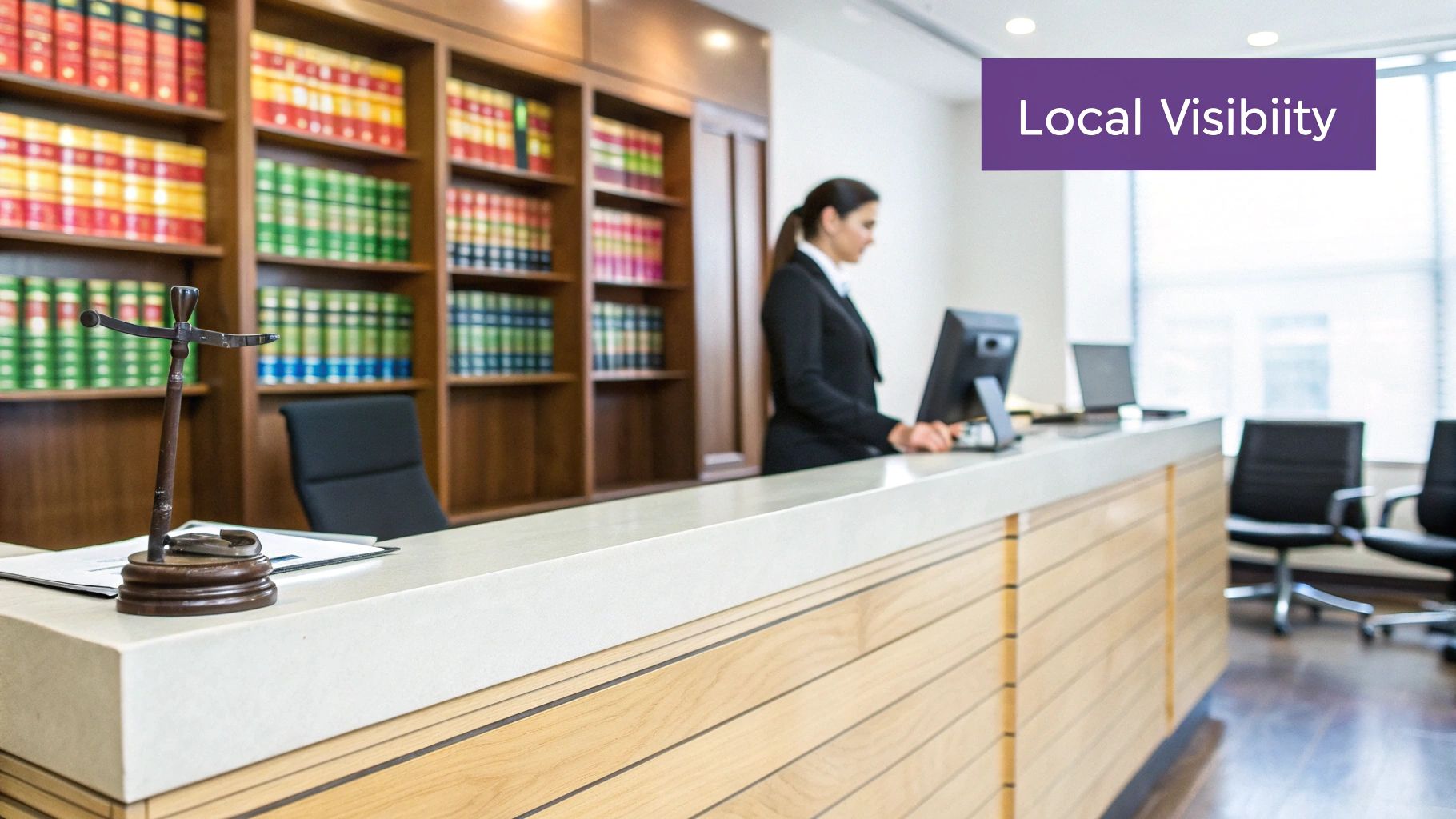
The days of relying purely on word-of-mouth referrals or a Yellow Pages ad are long gone. The way people find legal help has completely shifted. When someone faces an urgent legal issue, their first instinct isn't to ask a friend—it's to pull out their phone and search.
And they aren't just typing in "solicitor". Their searches are specific and, crucially, local.
Think about the phrases real people use: 'family law solicitor near me', 'conveyancing in Bristol', or 'criminal defence lawyer Manchester'. These aren't casual queries; they signal an immediate need for legal services within a specific area. This is precisely where local SEO becomes your firm’s most powerful client acquisition tool.
By mastering local search, you place your firm directly in the path of these highly motivated clients at the exact moment they’re ready to take action. It’s not about casting a wide, inefficient net. It’s about being the most visible, trusted local expert for the services you offer.
The Impact of Local Search on UK Law Firms
In the UK legal market, local search is no longer a 'nice-to-have'—it's a primary source of new clients. The data below paints a clear picture of why a strong local presence is non-negotiable for growth.
| Statistic | Implication for Your Law Firm |
|---|---|
| 60% of smartphone users directly call a business from Google search results. | Your Google Business Profile needs a clickable phone number, as many potential clients won't even visit your website before calling. |
| The top three organic search results capture 68.7% of all clicks. | If you aren't in the top three positions for your key local terms, you are effectively invisible to the vast majority of potential clients. |
| 'Near me' searches have exploded in recent years. | Clients prioritise convenience. Appearing for location-based searches shows you are accessible and ready to serve their immediate needs. |
These figures show a clear pattern: potential clients value convenience and relevance above all else. They are far more likely to contact a solicitor whose office is nearby and whose online profile looks professional and trustworthy.
A strong local SEO presence doesn't just generate website traffic; it generates high-quality enquiries from people in your community who are actively seeking legal help. It turns your website from a simple online brochure into a consistent lead-generation engine.
The Three Pillars of Local SEO Success
To effectively capture this local demand, your strategy needs to be built on a solid foundation. Throughout this guide, we'll walk through the actionable steps to strengthen the three core pillars of local SEO for lawyers:
- Your Google Business Profile (GBP): This is your digital shopfront. A fully optimised profile is the single most important factor for appearing in the coveted 'Map Pack'.
- Local Citations and Listings: These are online mentions of your firm's name, address, and phone number (NAP). Consistency across legal and local directories builds trust with Google.
- Client Reviews: Positive reviews act as powerful social proof, influencing both potential clients and your search rankings. A steady stream of 5-star reviews is gold.
When a potential client finds you online and decides to call, a missed call can mean a lost case. A professional answering service for law firms ensures every lead generated from your local SEO efforts is handled expertly.
For a deeper dive, you can also explore our comprehensive guide on https://www.bare-digital.com/local-seo-for-law-firms/.
Optimising Your Google Business Profile
Think of your Google Business Profile (GBP) as your firm’s digital front door. For many potential clients, it’s the very first time they’ll interact with your practice. A well-optimised profile is easily your biggest asset for getting into Google’s highly visible 'Map Pack'.
Frankly, getting this right isn’t just a recommendation—it's a non-negotiable for any lawyer serious about local SEO.
An incomplete or sloppy GBP listing can actively push potential clients away. On the other hand, a professional, detailed profile builds trust instantly and makes it dead simple for someone needing legal advice to get in touch. The aim is to give Google and its users every bit of information they could possibly need, all presented clearly and professionally.
Building a Standout Profile from Scratch
It’s the initial setup where so many firms trip up over small but surprisingly costly mistakes. You have to be precise. Your firm's Name, Address, and Phone Number (NAP) must be identical—down to the last comma—across your GBP, your website, and every other online directory. A tiny difference, like using "St." instead of "Street," can throw off search engines and weaken your local authority.
Beyond the basics, choosing the right business categories is absolutely critical. Don't just pick the generic 'Law Firm' and call it a day. Google lets you add more, so get specific.
- Primary Category: Start with the most accurate, high-level description, like 'Law Firm' or 'Solicitor'.
- Secondary Categories: Now, drill down into your specific practice areas. Add things like 'Family Law Solicitor', 'Criminal Defence Lawyer', or 'Conveyancing Solicitor'. This extra detail is what helps Google connect your firm with very specific local searches.
This infographic lays out a straightforward process for finding local keywords. You can then use these insights to sharpen your GBP categories and business description.
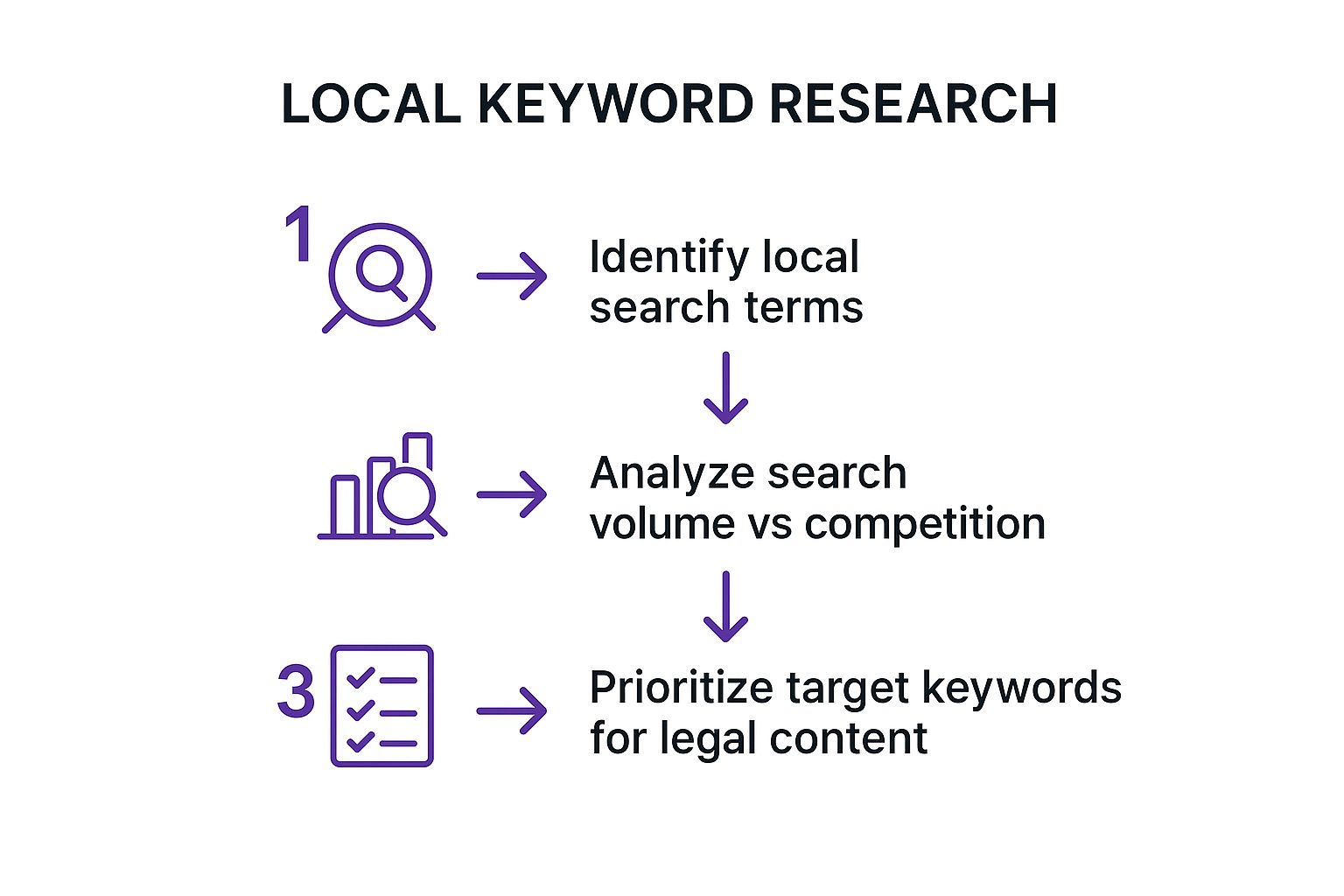
Moving from broad terms to specific, high-intent keywords is how you start attracting the right kind of local client—the one who’s ready to pick up the phone.
Adding Depth and Professionalism
With the core details locked in, it’s time to breathe some life into your profile. A sparse listing just looks untrustworthy. Make it a priority to fill out every single section to paint a full, engaging picture of your practice.
Your business description is your chance to make a strong first impression. You have 750 characters to explain what makes your firm the go-to choice for local clients. Weave in key phrases that sound natural, like 'expert divorce solicitors in Cambridge' or 'no-win, no-fee personal injury claims'.
High-quality photos are not optional. You need professional headshots of your solicitors, clear shots of your office (both inside and out), and your firm's logo. These visuals help humanise your practice and let potential clients see the real people they might be working with. For a full masterclass on making your profile shine, check out this in-depth guide on Google Business Profile optimisation.
A fully fleshed-out Google Business Profile sends a powerful signal to Google: it says your firm is a legitimate, active, and important player in the local community. Every section you complete adds another layer of credibility and relevance.
Engaging with Potential Clients Directly
Your GBP isn't just a static business card; it’s an interactive hub. Features like Google Posts and the Q&A section are there for a reason—they let you engage directly with your audience and showcase your firm's expertise and recent activity.
Think of Google Posts as mini-blog updates that appear right on your profile. Use them to share firm news, talk about a recent successful case (while protecting client confidentiality, of course), or promote a free initial consultation. Posting regularly shows Google your profile is actively managed.
The Questions & Answers section is another goldmine. People can ask questions directly on your profile, and you should be monitoring this and answering them promptly and professionally. Better yet, get ahead of the game. Add common questions your firm gets asked all the time and provide your own clear, helpful answers. This not only helps searchers but also lets you control the conversation around your services. If you really want to get ahead of the competition, dive into these proven strategies to improve Google Business ranking.
Finding the Keywords Your Clients Actually Use
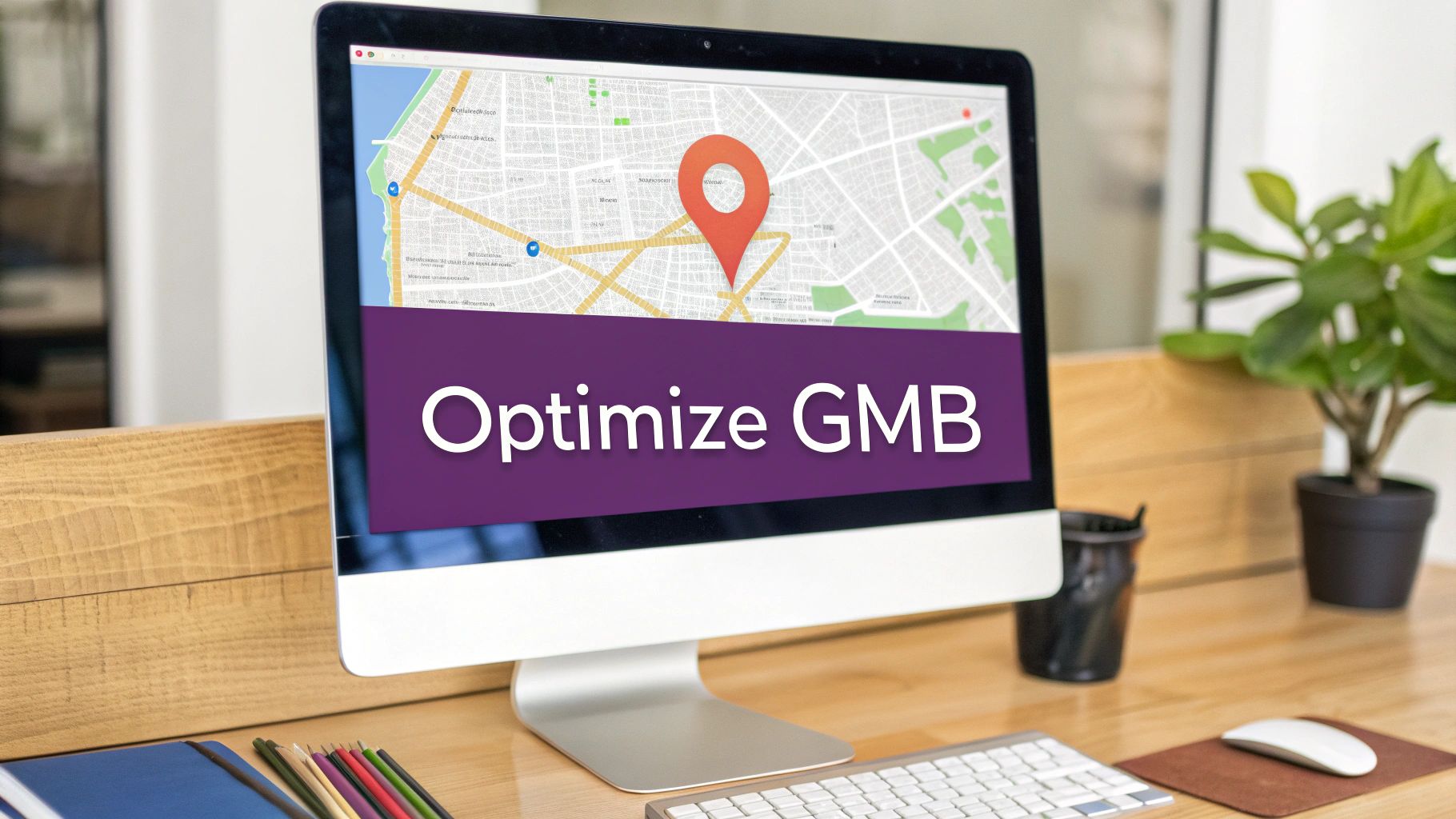
To bring in the right clients, you have to speak their language. That means getting inside their heads and using the exact phrases they’re typing into Google when they desperately need legal help. It’s a shift away from generic industry jargon like "solicitor" and towards the high-intent local keywords that signal someone is ready to pick up the phone.
Think of it this way: these specific phrases are the absolute bedrock of local SEO for lawyers. Without them, you’re just guessing what your clients are looking for. That’s a slow, expensive, and frustrating way to market your firm. A well-researched keyword list isn't just a task to tick off; it's your roadmap to getting found online.
Moving Beyond Generic Legal Terms
Let's get practical for a moment. A potential client in Cambridge with a neighbour dispute isn’t just searching for "lawyer". Their search is almost certainly going to be more specific, something like "property dispute solicitor Cambridge" or "neighbour dispute legal advice near me". That combination of legal service and location is pure gold.
This is where general SEO and local SEO part ways. Your entire goal is to pinpoint phrases that blend three crucial elements:
- Service: The specific practice area (e.g., 'conveyancing', 'family law', 'no win no fee').
- Qualifier: Terms that show they’re looking to hire someone (e.g., 'solicitor', 'lawyer', 'legal advice', 'costs').
- Location: The town, city, or even county you serve (e.g., 'Leeds', 'in Reading', 'Cambridgeshire').
By focusing on this formula, you start building a list of keywords that capture people with a genuine, immediate need for your expertise. For instance, a term like 'commercial property lawyer Reading' is infinitely more valuable than a broad, vague term like 'business law'.
Uncovering High-Intent Local Keywords
So, how do you actually find these golden phrases? The good news is that the process is more straightforward than you might think, and you don’t always need expensive tools to get started. The best place to begin is by putting yourself in your client's shoes.
What are the most common questions you hear during initial consultations? What specific problems are people bringing to you? Brainstorm every possible way someone might describe their legal issue, then pair those descriptions with the local towns and cities you serve.
A classic mistake is to only target the main city where your office is located. Many of your best clients will come from surrounding towns and villages. Creating specific content for these smaller localities can help you dominate search results where larger firms aren't even competing.
To really flesh out your list, use Google's own search bar. Start typing a service like "divorce solicitor" and just look at what Google suggests in its autocomplete feature. Those aren't guesses—they're real searches people are making every single day.
Integrating Keywords into Your Website
Once you’ve got a solid list of local keywords, the next job is to weave them naturally into your website. This is where all that research pays off, making it crystal clear to both Google and potential clients that you are the local expert they've been looking for. The key is to make it sound human, not like you're stuffing keywords in.
Primary Service Pages
Each of your main practice areas needs its own dedicated page. If you're a family law practice, don't just lump everything onto one 'Family Law' page. You need separate, detailed pages for things like:
- Divorce and Separation Solicitors in [Your City]
- Child Arrangement Order Advice in [Your City]
- Financial Settlement Lawyers in [Your City]
This structure lets you target very specific, high-value keywords on each individual page, which is far more effective.
Location-Specific Pages
If your firm serves multiple towns, create dedicated landing pages for them. A page titled "Personal Injury Solicitors in Peterborough" will always perform better for searches from that area than a generic, one-size-fits-all page.
Title Tags and Meta Descriptions
These are the little snippets of text that show up in Google's search results. Your most important local keyword for each page should be in the title tag, ideally near the start. The meta description is your sales pitch—it's your chance to write a compelling sentence that includes the keyword and makes someone want to click.
This kind of strategic keyword placement is vital. The shift towards local search is undeniable; analysis shows the share of website traffic from local searches in the UK jumped from 19.2% to 28.8% in just over a year. You can learn more about these local search findings and see for yourself how much this impacts businesses.
Building Authority with Citations and Reviews
Trust is the bedrock of the legal profession. It’s no different online. Once your Google Business Profile is polished, the next job is to bolster your local authority. This comes down to two powerful signals that tell both Google and potential clients you’re a credible, established practice: citations and reviews.
These elements work in tandem to build a consistent and trustworthy online presence. Think of them as digital word-of-mouth, validating your expertise and location for anyone searching for legal help in your area.
Demystifying Citations and NAP Consistency
A citation is any online mention of your law firm's Name, Address, and Phone number—what we call NAP. These listings, scattered across online directories, act as third-party verification for search engines. They confirm your practice is a legitimate local business.
The more consistent and widespread your NAP information is, the more confidence Google has in your firm's location and contact details.
But consistency is the absolute golden rule here. Even a tiny discrepancy, like using "St." on one directory and "Street" on another, can dilute the power of your citations and confuse the algorithm.
Every single citation must match the NAP information on your Google Business Profile and your website exactly. This precision is non-negotiable for building a strong local SEO foundation.
Your citation-building strategy needs to be methodical. Always start with the most authoritative sources first.
- Top-Tier Legal Directories: Begin with the essentials like The Law Society, Avvo, and Justia. A listing on these platforms is a powerful signal of relevance within the legal world.
- Major Data Aggregators: Make sure you're listed correctly with the core data providers that feed hundreds of smaller, local directories. Get it right here, and you'll save yourself a lot of headaches down the line.
- Quality Local Business Listings: From there, expand to well-regarded local directories. Think your local Chamber of Commerce or respected sites like Yelp and Yell.
A consistent NAP footprint across these platforms sends a clear message to Google: your firm is an established, trusted part of the local business community.
The Crucial Role of Client Reviews
If citations confirm your details, reviews confirm your quality. In the legal field, where the stakes are high, social proof is incredibly persuasive. A steady stream of positive client reviews is one of the most significant factors in both local search rankings and a potential client's decision to pick up the phone.
Study after study shows that a high volume of recent, positive reviews directly influences your position in the Google 'Map Pack'. But it's not just about the algorithm. Reviews are for humans. They offer a transparent look into the client experience you provide, building trust long before that initial consultation.
A Professional System for Encouraging and Managing Reviews
You can’t just hope clients will leave reviews; you need a simple, professional, and consistent process. The best approach is to make it an integrated part of your client offboarding.
1. Ask at the Right Time
The ideal moment to ask for a review is right after a positive outcome or at the conclusion of a successful case. The client's good experience is fresh in their mind, making them far more likely to share their feedback.
2. Make It Easy
Don't make clients jump through hoops. In a follow-up email, send a direct link to the review section of your Google Business Profile. A simple, polite request is all it takes: "We really value your feedback. If you were happy with our service, would you consider taking a moment to leave us a review on Google?"
3. Respond to Every Review
Engage with all feedback, whether it’s glowing or critical. Thank clients for positive reviews to reinforce their good experience. For negative reviews, respond promptly, professionally, and calmly. Acknowledge their concerns without getting into the specifics of the case and offer to take the conversation offline. This shows prospective clients that you take all feedback seriously and are committed to client satisfaction.
Beyond citations and reviews, a firm's commitment to protecting sensitive information is paramount. Exploring secure attorney video conferencing best practices can further solidify client trust and your professional reputation.
Earning Links and Creating Local Content
Once you’ve nailed your on-page SEO, GBP, citations, and reviews, you've built a solid foundation. Now, it’s time to really pull ahead of the competition. This is where advanced local SEO comes into play, focusing on establishing your firm as a true local authority.
We do this in two ways: earning high-quality local links and creating hyper-local content that genuinely speaks to your community. These aren’t just technical tweaks; they’re about building real-world relationships and proving your expertise on the ground. When you get this right, you send powerful signals to Google that your firm is the definitive legal expert in your area.
Building Authentic Local Links
Backlinks—links from other websites pointing to yours—are a huge part of SEO. Think of them as votes of confidence. For local SEO, the most powerful votes come from other respected, locally-based organisations. These links do more than just boost your rankings; they build genuine community connections and can drive highly relevant referral traffic straight to your door.
Forget about generic, mass-produced link-building tactics. They simply don't work here. Instead, your focus should be on strategies that embed your firm right into the fabric of the local community. For a deeper dive into this, our guide on how to build backlinks that actually last is a great place to start.
Here are a few practical ideas that generate fantastic local links:
- Sponsor a Local Event: Get involved with a community fun run, a local sports team, or a charity gala. The organisers nearly always feature their sponsors on their website, giving you a highly relevant, location-based backlink.
- Offer a Scholarship: Why not partner with a nearby college or sixth form? Offering a small scholarship for a student heading into legal studies often earns you a link from the institution's website—these are pure gold in terms of authority.
- Contribute to Local Publications: Write a guest article for a local business journal or an online community news site. You could offer your expert take on a recent by-law change or a legal issue affecting local businesses.
A single link from your local Chamber of Commerce or a respected community charity is worth far more for your local rankings than dozens of links from irrelevant, generic directories. When it comes to local link building, quality and relevance always beat quantity.
Creating Hyper-Local Content
Next up, it's time to turn your website's blog from a generic legal resource into a hub of hyper-local knowledge. The goal is simple: answer the specific legal questions your local audience is actually asking. This positions you as the undeniable expert for their unique situation.
This approach does more than just attract organic search traffic. It proves you understand the specific nuances of practising law right where you are. Ditch the broad topics and start drilling down into content that’s geographically specific and incredibly practical for potential clients.
This kind of content shows both users and search engines that you have boots-on-the-ground knowledge that some faceless, national firm could never replicate.
Just think about these examples:
- For a family law solicitor in Birmingham: A detailed guide on 'Navigating the Birmingham Family Court System' would be incredibly valuable.
- For a commercial property lawyer in Scotland: An article breaking down the 'Latest Commercial Tenancy Law Changes in Scotland' would attract a very specific, high-value audience.
- For a personal injury firm in Manchester: A post on 'Common Accident Blackspots in Greater Manchester and How to Claim' is directly relevant to people living in the area.
The UK legal SEO market is fiercely competitive, with specialist agencies putting a huge emphasis on local optimisation. A 2025 review of 73 law firm SEO companies in the UK found that while geographical targeting is weighted at 12% in their ranking algorithms, it's an essential piece of the puzzle for understanding local client demand. Discover more insights about these UK law firm SEO company findings to see just how critical specialisation has become.
Tracking What Matters for Your Firm

All the optimisation in the world won't matter if it doesn't deliver real results. The question is, how do you know if your local SEO strategy is actually working for your law firm? The trick is to sidestep the mountain of confusing data and laser-focus on the key performance indicators (KPIs) that directly grow your practice.
Success isn't about chasing every vanity metric. It's about monitoring the specific outcomes that prove you're attracting the right local clients. These are the numbers that translate directly into new enquiries and, ultimately, new cases.
Key Metrics to Monitor
Instead of getting bogged down by overall website traffic, you need to zoom in on the actions that signal genuine intent from potential clients in your area. These metrics tell a clear story about how well your local search presence is performing.
Your primary focus should be on:
- Google Business Profile Interactions: This is your most direct line to new business. Keep a close eye on the number of phone calls made from your profile, requests for directions to your office, and clicks through to your website. A steady climb here is a massive win.
- Local Map Pack Rankings: You absolutely need to know where your firm stands in the 'Map Pack' for your most valuable local keywords (e.g., ‘family solicitor in Cambridge’). Landing in one of those top three spots gives you incredible visibility.
- Local Organic Traffic: Dig into how many visitors are finding your website from organic searches within your specific geographical area.
Tracking these core metrics gives you a clear, uncluttered view of your return on investment. You're not just seeing more traffic; you're seeing more potential clients actively engaging with your firm.
Essential Free Tracking Tools
You don't need to shell out for expensive software to get started. Google itself provides powerful, free tools that offer all the data you need to measure the impact of your local SEO efforts. Getting comfortable with these is fundamental to making informed decisions.
- Google Business Profile Insights: This is built right into your GBP dashboard and it’s brilliant. It gives you a straightforward look at how people find and interact with your listing, including the search queries they used, phone calls, and direction requests.
- Google Search Console: This tool is a goldmine for understanding which search terms are driving traffic to your site and what your average ranking position is for them. It’s invaluable for seeing how visible you are for those critical local keywords.
- Google Analytics: For a deeper dive into your website's performance, this is the tool. You can see which pages are the most popular and, crucially, track how many visitors from your target location actually complete a contact form or make a phone call.
By regularly reviewing the data from these tools, you can make much smarter decisions to keep growing your practice. For a structured approach, our comprehensive local SEO checklist can help ensure you're ticking all the right boxes.
Frequently Asked Questions
Even with the best strategy laid out, a few common questions always pop up when we talk to solicitors about local SEO. Let's tackle some of the most frequent ones we hear.
How Much Should a Law Firm Spend on Local SEO?
This is the million-pound question, isn't it? The honest answer is: it depends. The investment in local SEO can vary massively based on your goals and your market.
A solo practitioner in a smaller town could start seeing some real traction by spending around £500 – £1,500 a month. This would cover the foundational work needed to get the ball rolling.
But if you're a competitive firm in a major city like London or Manchester, you're in a different league. To make a dent, you'll likely need to invest £2,000 – £5,000+ per month. That budget is needed to fund the advanced link building, consistent content creation, and intensive optimisation required to stand out. It all comes down to your location, how fierce the competition is for your practice area, and how quickly you want to grow.
How Long Does Local SEO Take to Show Results?
I'll be upfront: local SEO is a marathon, not a sprint. While you might see some encouraging little jumps in your Google Business Profile rankings within the first 30-90 days, achieving the kind of results that genuinely move the needle takes a bit longer.
For competitive legal keywords in a bustling city, it typically takes 6 to 12 months of consistent, focused effort to secure those coveted top spots in the local pack and see a meaningful increase in client enquiries. Patience and consistency are everything.
Can I Do Local SEO for My Law Firm Myself?
Yes, you absolutely can. If you follow the steps we've outlined in this guide—nailing your Google Business Profile, actively managing reviews, and keeping your NAP details consistent—you can build a really strong foundation on your own. This DIY route is perfect for firms just starting out or those with a tighter budget.
However, there comes a point where your time is better spent on billable work. As your firm grows, the more advanced tasks like strategic local link building and creating hyper-local content become incredibly time-consuming. That's usually the tipping point where partnering with a specialist agency can seriously accelerate your growth and deliver a much stronger return on your investment.
Ready to see how a specialist local SEO strategy could transform your client acquisition? Bare Digital offers a transparent, results-driven approach to help your law firm dominate local search results. Get your free, no-obligation SEO Health Check and a customised Activity Plan today.
Learn more and request your complimentary audit at https://www.bare-digital.com.


